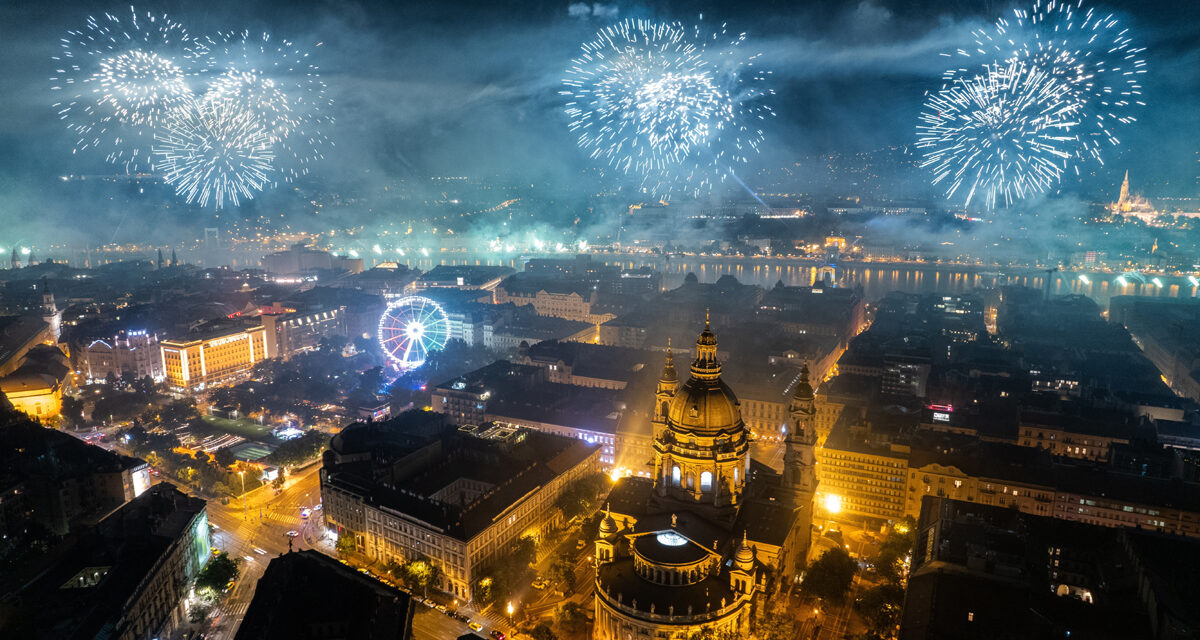The only coherent content element of August 20, the fireworks, has now clearly become a political watershed, a means of demonstrating one's relationship to the system – loyalty or resistance.
"The holiday of nothing" - this is how Népszava and its author greeted August 20 with this editorial. And that's right. It had to appear exactly where it did, and it had to be written by the person who wrote it.
That and this. We quote again, almost maniacally, Elemér Mályusz and one of his best works, The Red Emigration:
Obscure journalists, adventurers avoiding the battlefield, and non-party leaders rushed forward. Among the millions of workers and soldiers, no one sympathized with them, the masses did not stand behind them; they were instinctively averse to them. They could never have achieved their goal by openly declaring their aspirations. So they had to resort to deception. In order to deceive the masses, they were looking for a man whose name sounded good.
This is how they chose Count Mihály Károlyi, who not only dazzled the people with his princely wealth, but who certainly seemed fit to play the role assigned to him. They knew that he was mentally severely limited, an independent person, whose life took place in gambling and at the card table. […] In order to mislead the masses, they cover up their mistakes and try to shroud them in a nimbus at every possible opportunity. They gain artificial popularity for him by promoting him as democratic and a friend of the people. During the war, it was reported that he had a secret, but even closer relationship with the leading statesmen of the Entente [Entente], and thus he was the only one who could ensure the vital interests of the Hungarian nation. The people don't like him, because they owe him nothing, but they don't hate him either, because the cunningly and artificially established reputation confuses him in his judgment. And those who aspire to power keep pushing Károlyi in front of them. They stand behind him and let the count speak for them. This is how they achieve that their passwords spread among those who would otherwise plug their ears if they knew who they came from.
Familiar, right? The People's Voice is the heir to these and this one.
And H. Miklós? And this:
When the emigrants crossed the Hungarian border while fleeing, their hearts were not crushed. They did not feel the pain that grips everyone when parting from a loved one. They didn't have to part with anyone: they didn't leave the country. This has long been denied, ridiculed, trampled in the mud. The invisible threads that connect everyone to the race from which he came, to the land on which his cradle rocked, to the family, to the environment in which he grew up, have long been severed.
(Mályusz: old work.)
And let's read in the same place the villain named Imre Roboz, the intellectual and spiritual brother of H. Miklós:
To hell for the peasant, with worm nostalgia, to the fire with all thoughts of Pest, Hungarian worries, Hungarian obsession. Up for the great journey, the great attempt, the great stranger! There, the sun shines brightly far away, the flowers are fragrant, the woman's kiss is hot, the song is resounding and the gold is shining. What am I whispering before the curtain of the ugly Hungarian tragedy? Why should I shudder at the sight of weeds and foolish self-mutilation, what should the agony of Pest's meanness hurt me, what should my proud zest for life, my healthy will to live, my rightful human peace be destroyed by the destruction of Hungary? Why should I be a good son, a loyal son of a bad country, a disloyal country! Behind me is the Hungarian landscape: let it remain. The destruction of Hungary is behind me: let it perish. I didn't need it, I don't need it either. My weak people, my cowardly people, vile people, what do I have to do with you? Work, thought, freedom, strength, revolutionary fever: I am heading towards you, forward. I won't look back at you. […] I may never meet a Hungarian word, a Hungarian word.
That's how all the rats left. But at least he left - which was a great relief. Unfortunately, these will remain today. And they "celebrate" "nothing".
"Why should I be a good son, a loyal son of a bad country, a disloyal country!" That's their creed. And when is the home bad and unfaithful? When they are not in power. Of course, we don't think that if somehow - mostly by violence, treason and treason - these scoundrels rise to power, then the country will suddenly become good and loyal to them! Then, as long as they are in power, the country will be a whore that can be exploited, sold out, sold and resold. Nothing else.
They were like that, they remain like that, they can give nothing but our essence. And that nothingness: the projection of the essence of themselves, their personality.
The question of what kind of nation is the one that cannot celebrate its biggest (?) holidays together, no one asks anyway. The only coherent content element of August 20, the fireworks, has now clearly become a political watershed, a means of demonstrating one's relationship to the system – loyalty or resistance.
This and that is the credo of the Hámiklós people. Loyalty or resistance: these are bullshit. They have never been loyal to this land, the resistance is not even known from the news, but they always play it with great experience.
But when did they actually stand up to anything? Never.
In Soviet times, they were Moscow's most loyal foot lickers, and of course they were exactly the opposite. They are now the most loyal foot-lickers of Brussels and Washington - ideology is not left behind. Even then, they served "progress" and a "superior social order", and they are still talking about the same thing now.
Then east, now west. These can be exchanged at any time. Just like home. Which is nothing, including his holidays.
Not that it has any importance, but let's record it anyway:
just as in the Kádár regime, the question of how much the fireworks cost, and what the money should or could be spent on, was never asked during the reign of the socialist-liberal governments after the regime change.
I think Edda Budaházy wrote convincingly about this:
"On the sidelines of the ``why don't we buy toilet paper for hospitals?'' vs. fireworks debate: Our ancestors celebrated the holidays even if they went hungry for a winter afterwards. They slaughtered the last chicken, the last piece of bread was given to the Easter feast, they put on their only beautiful white shirt and did not lie down in the clean room, even if ten people were miserable in the other, because they knew that the significance of the holiday is that it lifts the spirits. , lifts hearts to God, which is worth more than any money. This pitiful struggle against fireworks shows how much today's materialistic consumer does not understand the point. The world is being disenchanted, great forces are working to ensure that there are no beautiful, noble, uplifting values, principles, beliefs, holidays, women and men, only a large mass who no longer wish for God, it is enough for them if there is toilet paper in the toilet. We Hungarians have something to celebrate. Don't believe the naysayers."
That's what it's about. And, of course, Gyula Illyés also wonders: Home, on high.
Will there come a time when remembering / will be a braver thing than planning - / a braver new home in the past / to explore than in the future -? / What's wrong with me! – my country already stands, / more protective than any height. / I just look around, walk, live, / I got weapons, magic spells. / I will already share it if I tell you / what this safe, secret home is like. / Roar, brother, a line of Petőfits, / a magic circle is created around you. / If a new Tartar army, if a Kufár army / floods the clear landscape, / if our roads become twisted, / like earthworms, if they step on us: / you say to yourself, with your eyes closed, / just say the words that once made / quicksands, peoples, houses / They came together as Hungary. / Raging rivers are your guarantee, / sedges - don't forget this, / if we go back with a proud mouth, / like to our castles, our secrets. / Because it doesn't scare us, what can only scare us, / it can't kill us, what would only kill us, / whisper a magic shirt to yourself, / call our Berzseny into the night. / While you were walking in the open fields, / collect, comrade, what you saw, / what you looted with your heart and mind, / in cheerful discussions, with girls. / Like Noah in the ark once, / bring variety from every thought, / I also imagine the role of an orphan, / also the animal army of your dreams. / Let them lurk even for a millennium / silently, like an echo, if they are not asked, / your words will be all the more surprising / to those who ask. / So listen and learn from the example, / the far-reaching silent one. / Clutching my book to my bosom, / I look at myself laughing. / Because even if nowhere: I stand at home, / because what I see is real, / even if, like a mirage, / I see the world upside down. / So I will remain a messenger / guarding treasured cemeteries. / They can shoot you in the forehead if you like, / what nests there, goes up into the sky.
The villains of nothing only agree on this: a shot in the forehead. And even the bad home, the unfaithful home is not their invention, James Joyce invented it for them:
Let the home die for me.
But Horace also testified:
Dulce et decorum est pro patria mori" - that is, "It is sweet and fair to die for one's country.
From Horace to Joyce, about two thousand years. From Joyce to the Hámiklósoks is a chicken's step.
It's been maybe eight years since I wrote this:
"'Let the homeland die for me!'" exclaimed James Joyce, and perhaps he did not even think that he was formulating one of the fundamental principles of modern-day liberalism. And from this two-dimensional world view, it also logically follows that if we have broken our dependence on the family, the country, the nation, and God, then we have to look for something new to break, because if there is no more dependence, then the dogma of absolute freedom disappears. This is why the liberalism of our time turns to the breakdown of natural determinisms. Nature, biological determinism no longer matters - so don't let biology determine what I (ME!) really am!"
We're over that too.
And the certainty remains: they celebrate nothingness with their nothingness and nothingness, so there is nothing, because we can't have anything to do with them.
We have our country, they don't. It's good to keep that in mind.
Featured image: Fireworks in Budapest on August 20, 2024, on the occasion of the founding of the state and the founder of the state, King Szent István. The Szent István Basilica can be seen in the foreground. MTI/Zoltán Máthé













